Retreats are a powerful way to center yourself and bring focus and clarity to your life.
But… going somewhere isn’t always available.
So, I love this option of an at home retreat! It can be something done annually, quarterly or monthly.
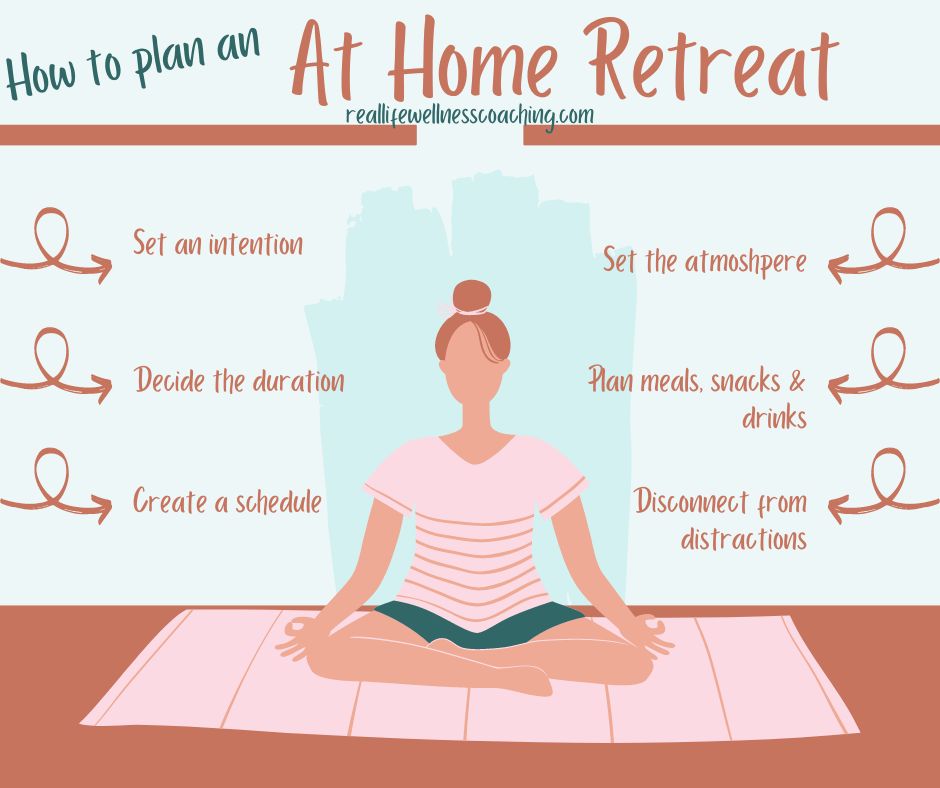
1. Set an intention for your retreat
An intention of a retreat is an important step of planning it- it is the “why” behind it. It will set the tone and the purpose and then everything else that goes into it will follow. Intentions are different than goals. Goals are more one-dimensional where intentions have more depth to them. Goals can support an intention.
- For example:
- an intention for a retreat could be to bring more peace and calm to your life.
- goals that would support that intention could be- meditating, starting a gratitude journal, watching the sunset, etc.
Be specific in this process of setting an intention for your retreat. Taking some time to journal asking these questions:
- What do I need clarity on right now?
- Where do I feel aligned?
- If I could create something different in my life right now, what would it be?
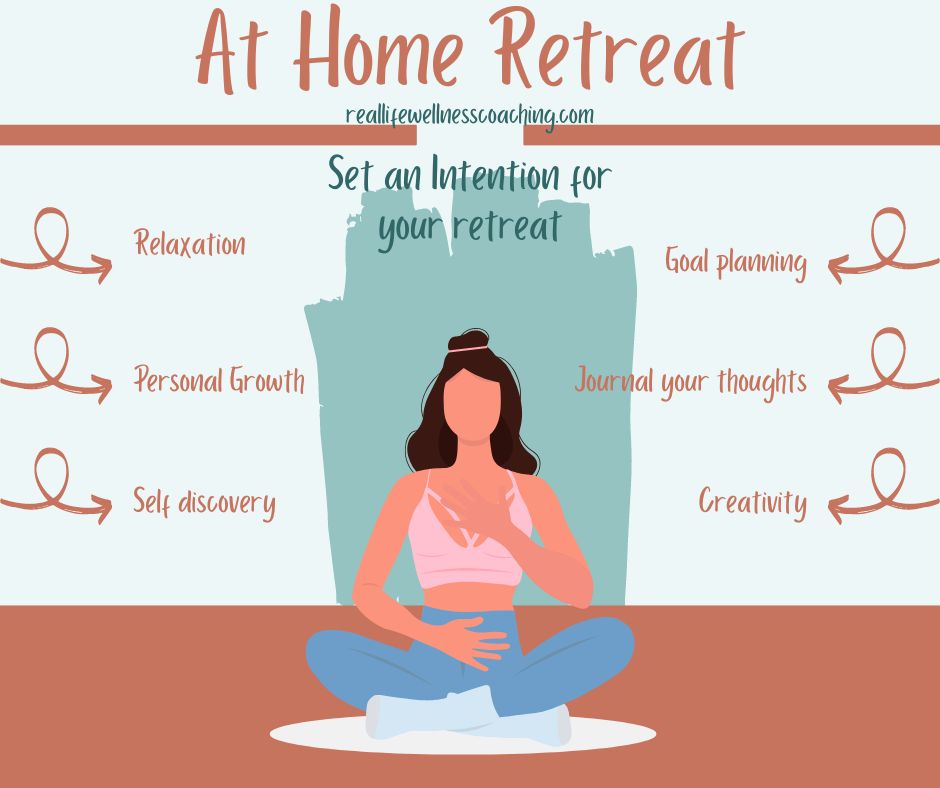
2. Decide how long your retreat will be
For logistical and planning purposes, decide on a length. Take into consideration your intentions, goals and schedule.
- Evening
- Morning
- Weekend
- Week
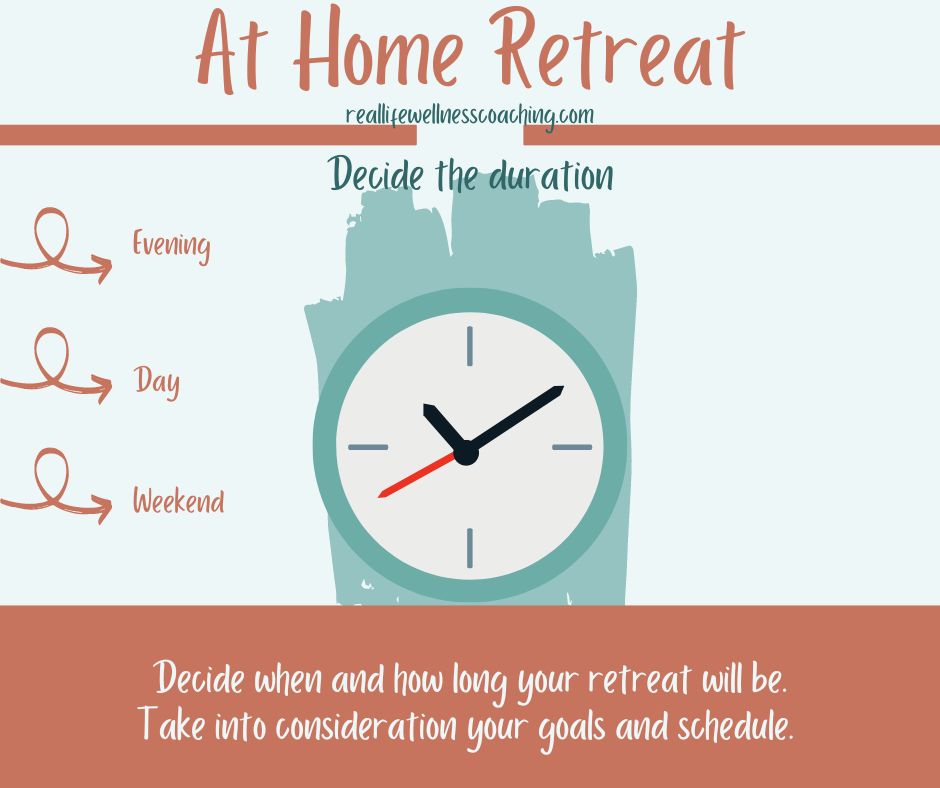
3. Create a schedule
Your schedule is going to depend on the length and intention of your retreat. Some things to consider is space for relaxation, movement, focused intentional activities, meals, and time in nature.
Here is a sample of a day retreat schedule:
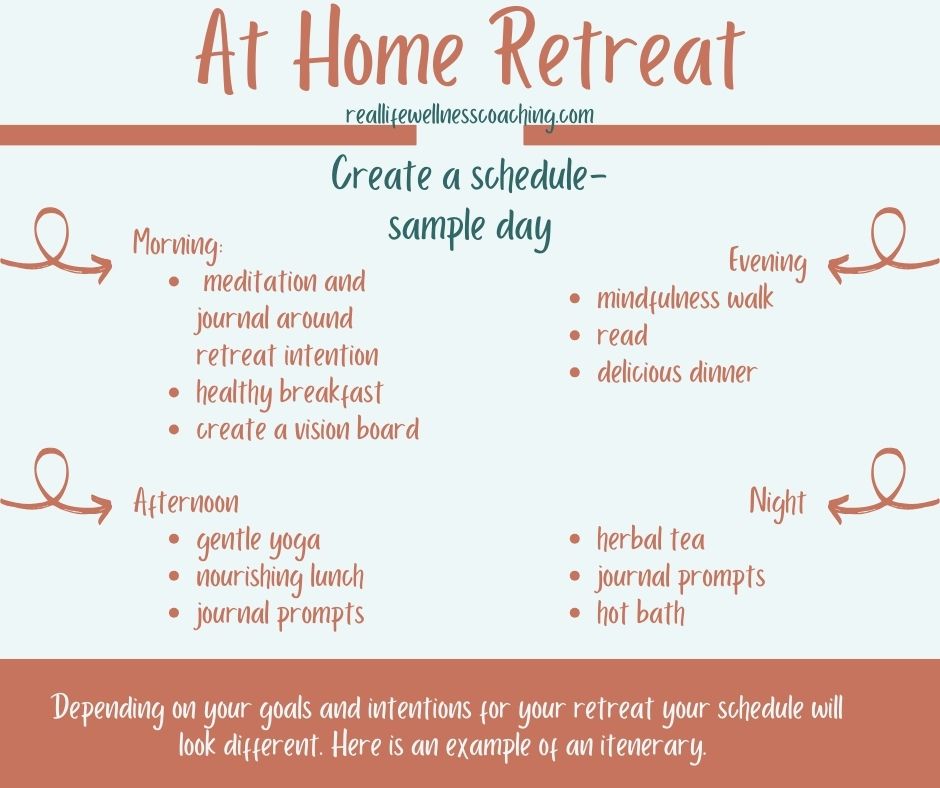
4. Set the atmosphere
The atmosphere you create for your retreat sets the tone and can help the experience be more meaningful. It will be personal for each person. A couple of things that I would recommend for all situations would be- having a clean and clutter free space and using a room that is not used often or you can make distraction free.
When thinking about atmosphere, use all 5 senses- sight, smell, taste, hearing, and touch. Here are some ideas to consider in each category:
Sight- soft lighting, decluttered and clean area, pictures that are calming, flowers or plants.
Smell- essential oils to diffuse or spray, non-toxic candles
Taste- gum or mints (we will dive into meals, snacks and refreshments later)
Hearing- a playlist, windchimes
Touch- soft blanket, pillows, yoga mat, eye pillow, crystals or stones
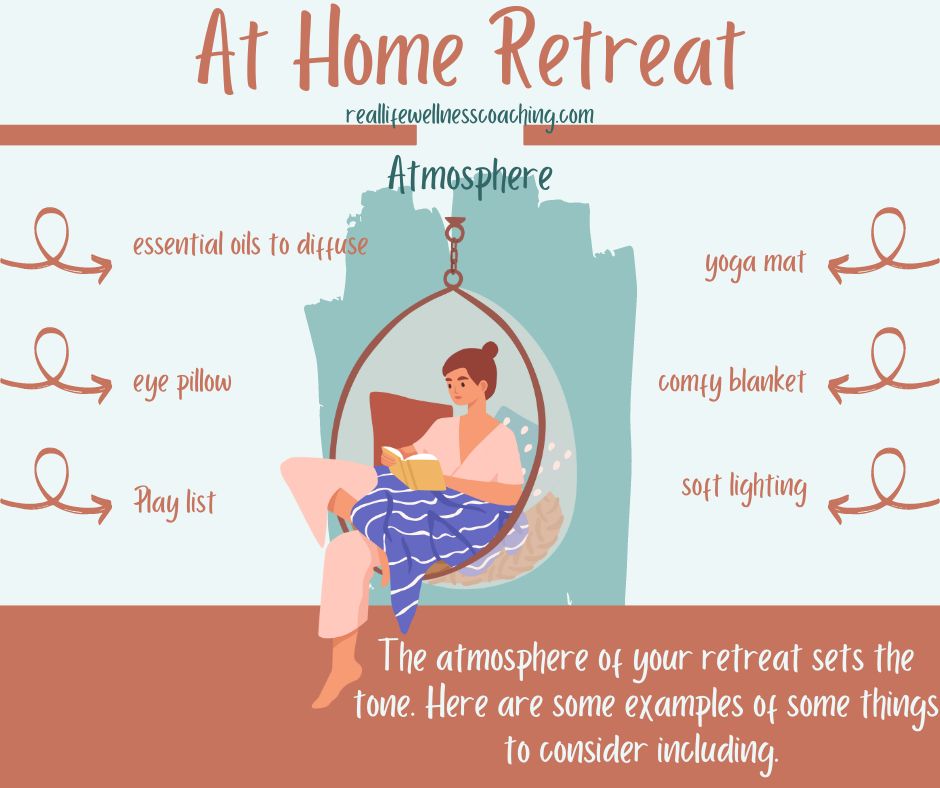
5. Disconnect from distractions
Disconnecting may be one of the hardest things about the retreat (at least at first) but will also be one of the most impactful. Having a distraction-fee space and time will enhance everything else that you are doing within your retreat. Stepping away from distractions allows you to connect more fully with yourself.
Here are some things to consider:
- Turn your phone off for the entirety
- If you can’t turn it off (or airplane mode and Wi-Fi off) for the whole time, have it off with short, focused, scheduled times that you turn it on
- Set an out of office message auto response for your email and don’t check messages during your retreat
- Inform family, friends and work that you will be unavailable
- Avoid social media and the news
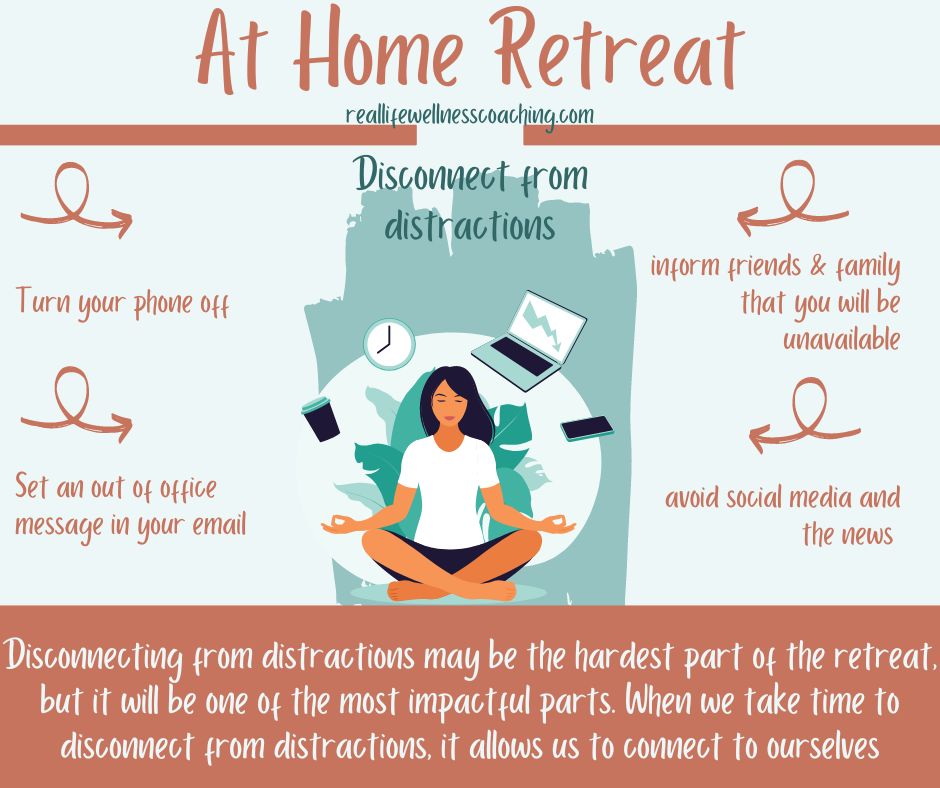
6. Plan meals, snacks & drinks
Encourage mindful eating and drinking that focuses on nourishing your body during your retreat. Take time to savor meals, snacks and drinks undistracted.
Here are some examples of things to include if they align with you:
- focus on whole nutritious foods
- fresh fruits and vegetables
- hummus & veggies
- yogurt with fruit & granola
- trail mix
- granola bars
- nourishing protein shake
- hot herbal tea with lemon
- fruit infused water
- special treat like dark chocolate or a glass of wine
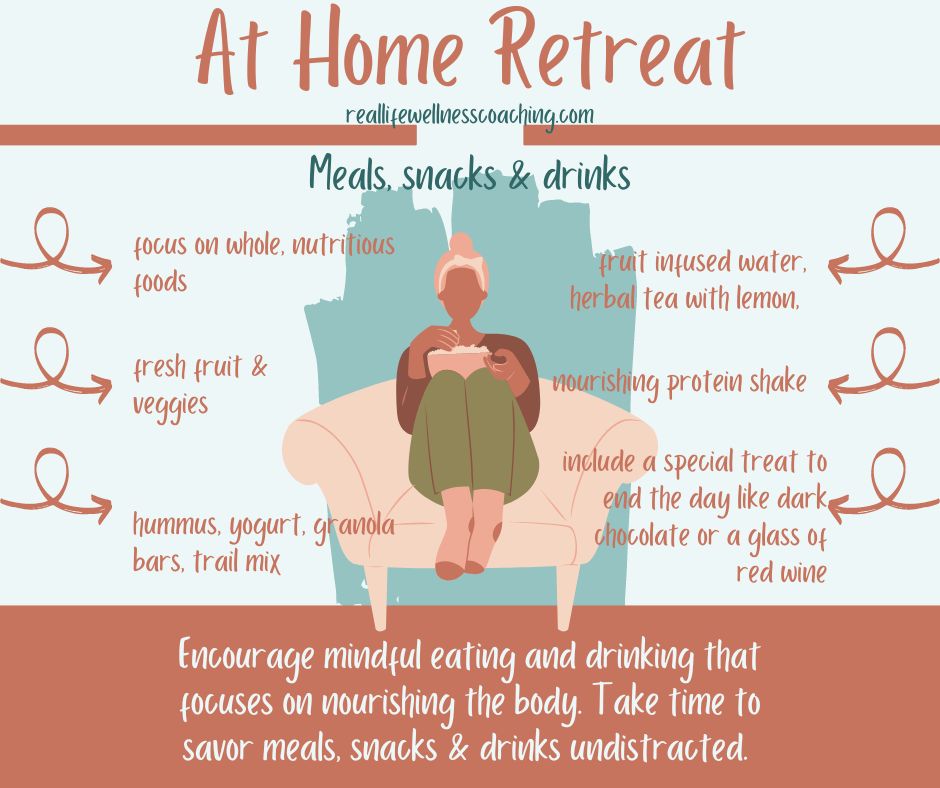
7. When the retreat is over:
Once your retreat is over, allow time to reflect on your experience. Consider what you would like to take back to the “real world”. Give yourself a gradual re-entry with set times to journal on your experience and what you have learned. Think about any gratitude that has come up and expand on that and revisit any areas of interest.
Let’s explore how an at home retreat can affect us holistically- mind, body and spirit.
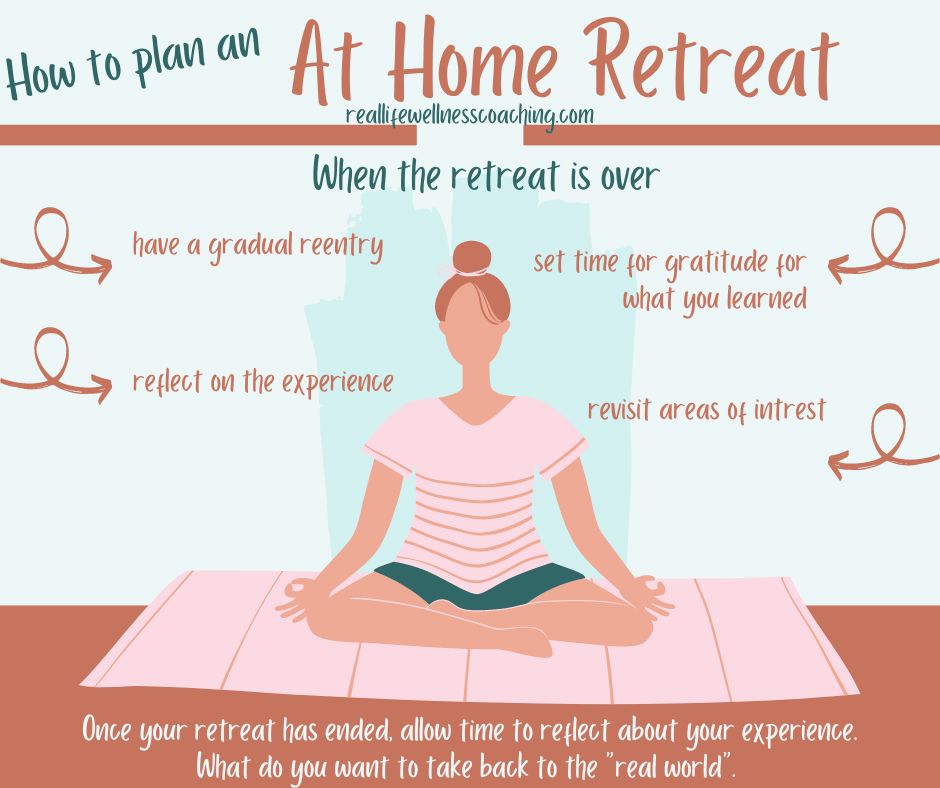
Body:
To connect with your body during a retreat, find ways to discover what feels good to you. Some options that I personally like are:
- yoga
- walking
- stretching
- foam roller
- nature hike
- massage
But maybe other things feel good to you. This is a great time to explore what you like.
Soul/Spirit:
Connecting with your spirit/soul is a common space that people feel disconnected in regular life. During a retreat finding that connection can be an important piece. This looks different for everyone, so take some time ahead to figure out what that looks like for you. Remembering the spirituality looks and means something different to everyone. Sometimes there is a religious component, but not necessarily. It is really about connecting to something greater than ourselves.
- Books
- Journaling (notebook, colorful pens, prompts)
- Environment (cozy blankets, yoga mat, pillows, eye mask)
- Sounds (wind chimes, playlist)
- A natural trail or hike
- Watching a sunrise and/or a sunset
Mind:
During a retreat having space to get in touch with your thoughts and mindset is also important. Our thoughts drive our feelings and actions, and even when it doesn’t feel like it, we do have control over our thoughts. This is good news, but it doesn’t mean that it comes naturally, especially at first.
Pay attention to your thoughts during this time and reflect on where your thoughts tend to go in your everyday life. How are they contributing to your actions. We are programed to have a negative bias and can easily go to thoughts like- ” I just have bad luck.” “Things never work out for me.”, “I will never be able to do it.”
Some questions to consider:
- Do my thoughts help me or hold me back from what I want to accomplish?
- Would I say to people that I love what I am saying to myself?
- What are some ways I can make small progress towards what I want?
Bottom line is that the goal of a retreat is to break away from your regular daily routine and schedule. Providing yourself with opportunities to connect with yourself on a deeper level will help you feel rejuvenation and balance.
Empowering you to take charge of your health and wellness!
1:1 Wellness Coaching
- Working 1:1 together to build routines, confidence and a life that you love!
- Schedule your complimentary consultation!!
Join my monthly membership: Register here
✨ Your Daily Dose of Wellness—Made Simple! ✨
Busy schedule? No problem! Our Wellness Membership is designed for real life, giving you practical, doable challenges delivered straight to your inbox every morning. Small, intentional steps = BIG results for your health and happiness!
💌 Here’s what you’ll get each week:
🌿 Monday: A guided meditation to start your week with clarity & peace
💡 Tuesday: A deep dive into a trending wellness topic—learn & grow
✨ Wednesday: Simple, powerful wellness wisdom you can use immediately
📝 Thursday: Four thought-provoking journal prompts for self-reflection
🏋️♀️ Friday: A fitness idea for all levels—move in a way that works for YOU
✅ Saturday: A quick check-in to reflect & reset
🥗 Sunday: A simple meal plan to make healthy eating effortless
This isn’t another overwhelming program—it’s bite-sized wellness, designed to fit into YOUR life.
🌟 Join today and make wellness work for you! 🌟
BackNext
And get ready for this…. you get everything I mentioned above included for only $29 a month!!! That is less than $1 a day!
My podcast!! Listen in your way:
Weekly Wellness Newsletter
- Just for signing up for my newsletter, you automatically get access to your guide to starting on your wellness journey.
- Receive an email every Wednesday with a different way to make wellness simple in your life.
Follow me on Social Media:
See what wellness looks like for me in my everyday life & you get more pictures of Lilo!!
- Instagram– follow my stories and reels
- On Pinterest – come pin with me – check out my boards for my favorite meal planning ideas and more!
- & if you want to dive into wellness a more, join my FREE private Facebook Group: Wellness for Real Life- body, mind and spirit
Be well,
Faith
***Some of the links in my posts contain affiliate links and I will receive a small commission if you make a purchase after clicking on my link. I pinky promise I will always give my honest opinion of any product and would never recommend something if I did not use and love it!!
D I S C L A I M E R Anything that I discuss about making any lifestyle changes is from my own experience and/or other clients personal experiences and may not be suited for you. It is strongly recommended that you consult with your health professional before making changes in your own life. By engaging in anything that I talk about, you agree that you do so at your own risk.